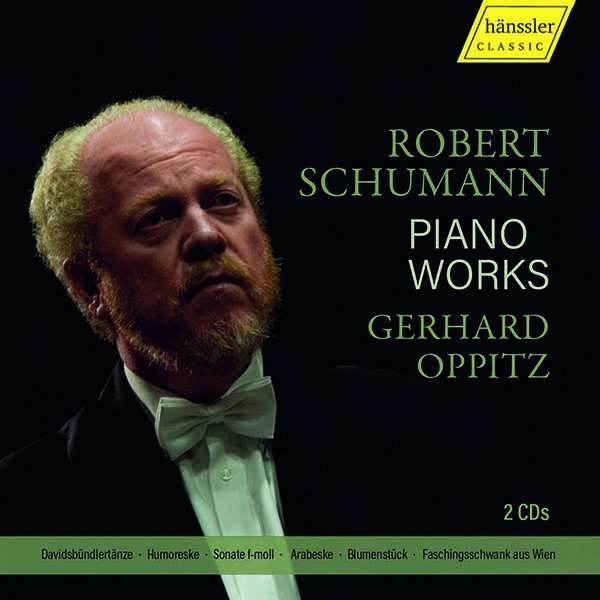Gerhard Oppitz beginnt sein Schumann-Album mit den Davidsbündlertänzen. Er spielt diese Musik mit klarem Anschlag (der durch einen für meinen Geschmack zu halligen Aufnahmeklang an Klarheit verliert), zupackend und kontrolliert. Er setzt auf Kontraste und stellt die Welten des Florestan und Eusebius raffiniert gegenüber, versteht es prächtig, von der einen zur anderen zu wechseln. Sein Markenzeichen, Natürlichkeit und interpretatorische Ehrlichkeit, verbindet er mit stimmiger Technik und meist gutem Gespür für Schumanns romantische Ausdruckswelt.
Oppitz fängt auch die Stimmungsumschwünge der Humoreske gut ein. Er spielt sich ungestüm durch die schnellen Abschnitte. Umgekehrt profitieren die introspektiven Passagen von einem runden, singenden Ton, und seinem organischen Sinn für Rubato und schlüssig geformten Basslinien.
Die Sonate op. 14 ist nicht weniger beeindruckend, voller lyrischem Schwung und Inspiration. Der Zyklus ‘Faschingsschwank aus Wien’ ist rhythmisch ausgefeilt, aber in der Romanze fehlt mir etwas Gefühl und im Scherzino auch Heiterkeit. Die beiden letzten Sätze sind brillant, aber auch nicht besonders inspiriert. Damit haben wir mehrheitlich Interpretationen die uns gut gefallen, nur im Faschingsschwank kann uns Oppitz nicht ganz überzeugen.
Gerhard Oppitz begins his Schumann album with the Davidsbündlertänze. He plays this music with a clear touch (which loses clarity due to a recording sound that is too reverberant for my taste), gripping and controlled. He relies on contrasts and cleverly juxtaposes the worlds of Florestan and Eusebius, knows splendidly how to switch from one to the other. He combines his trademark naturalness and interpretive honesty with coherent technique and a good feel for Schumann’s Romantic world of expression.
Oppitz also brilliantly captures the mood changes of the Humoreske. He plays impetuously through the fast sections. Conversely, the introspective passages benefit from a rounded, singing tone, and his organic sense of rubato and coherently shaped bass lines.
The Op. 14 Sonata is no less impressive, full of lyrical verve and inspiration. The cycle ‘Faschingsschwank aus Wien’ is rhythmically sophisticated, but I find some feeling missing in the Romance, and merriment in the Scherzino. The last two movements are brilliant, but not particularly inspired either. Thus we have a majority of interpretations that we like well, only in the Faschingsschwank Oppitz cannot quite convince us.




















